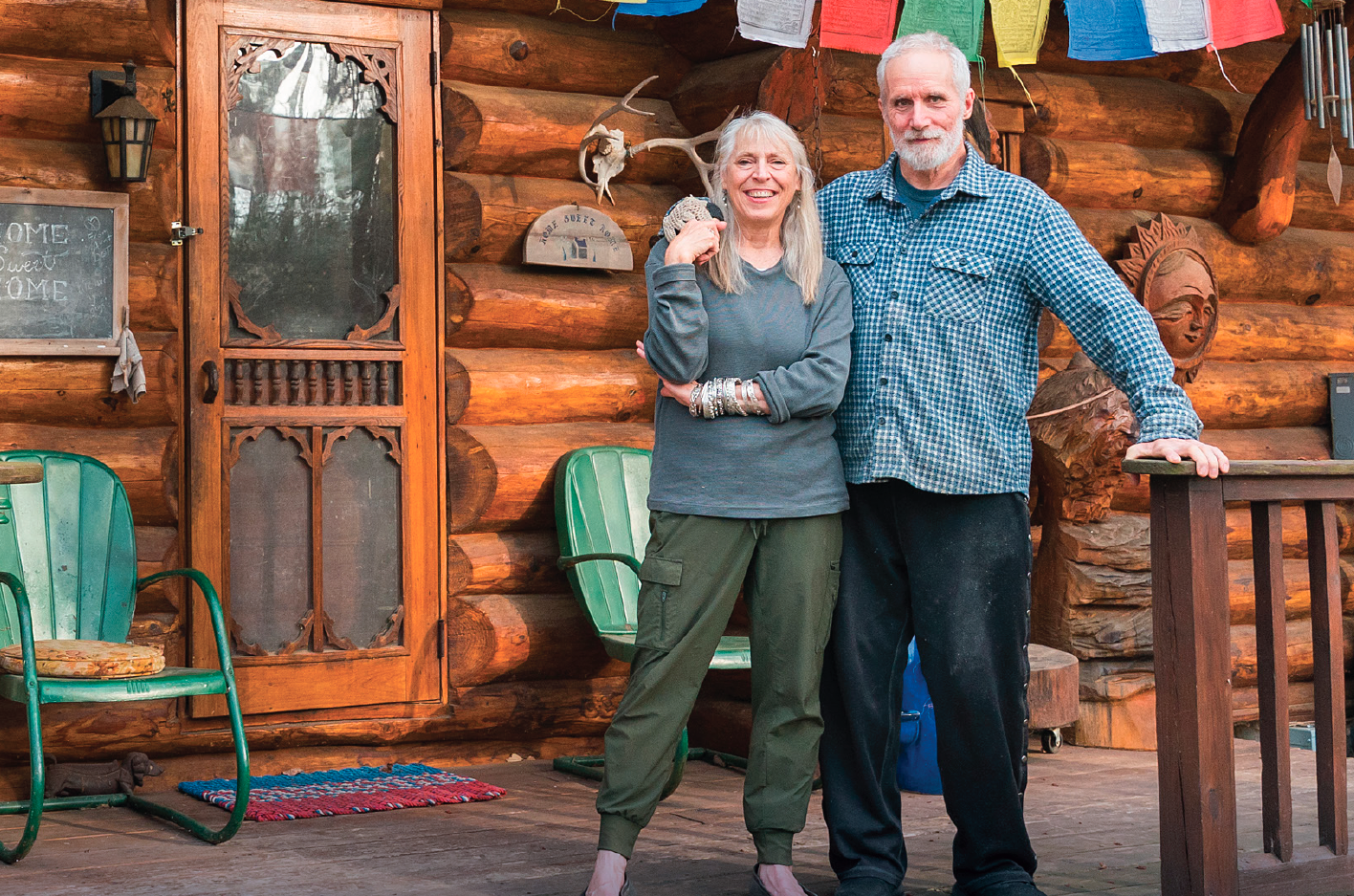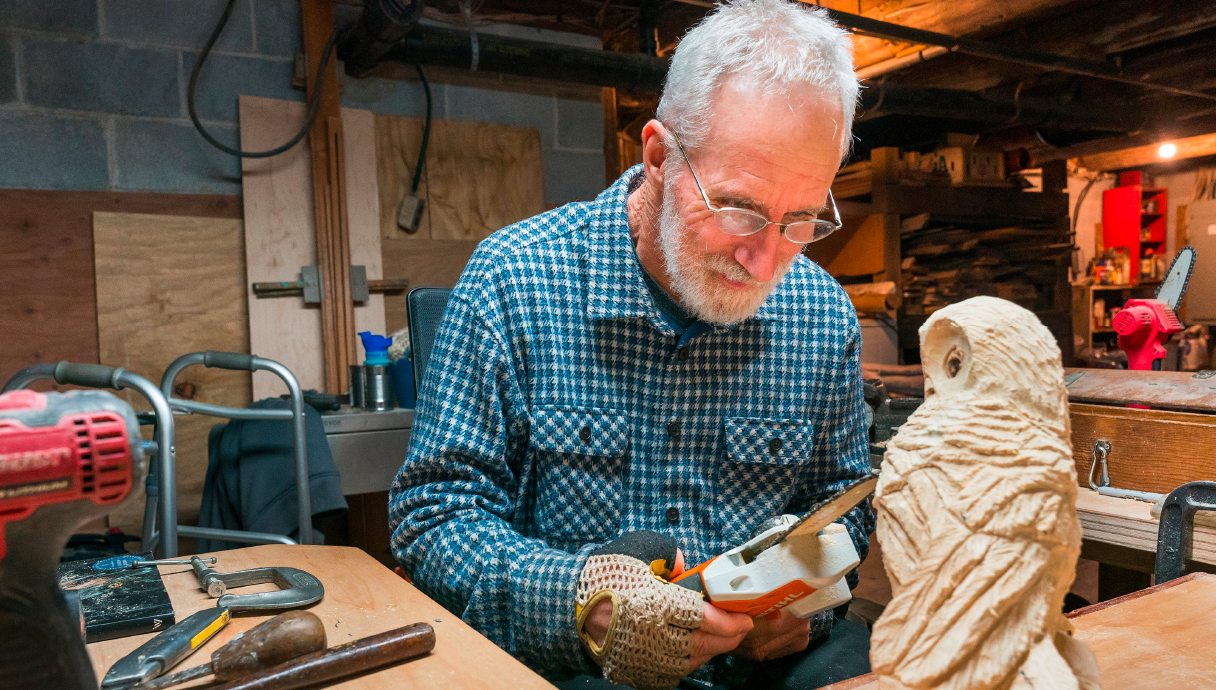October 27, 2025
Home Mods for a Home Base

Home Mods for a Home Base
By Lauren Tilghman
Todd Gladfelter and Cindy Ross may be the two most interesting people in East Brunswick, Pennsylvania. Nearly 40 years ago as a young couple in their 20s— without any construction experience—they built their forever home, a two-story log cabin, in the middle of the woods using raw trees and salvaged, recycled materials. Together they’ve hiked thousands-upon-thousands of miles, including a few rugged 500-mile treks across the Rocky Mountains with llamas carrying their two (now adult) children as toddlers. Individually, they’re both well-respected artists; Cindy is a painter, writer, and author of several books, and Todd is a chainsaw wood sculptor. Among the busyness of their homestead life, they still find time to serve their local community through volunteer projects and founded their own nonprofit to support veterans recovering from post traumatic stress disorder (PTSD). With all their many adventures and accomplishments, the least fascinating thing about them is their experience navigating life-altering injuries. In 2021 Todd slipped off the roof of his workshop, shattered his C3-C5 vertebrae, became paralyzed, and now lives with quadriplegia.
The diagnosis felt like a jarring blow; doctors said Todd would never walk again. He spent over a month in an intensive in-patient rehabilitation facility before transitioning home with a short nine weeks of in-home therapy and nursing care. “It was wicked hard coming home; that was the hardest thing I think of the whole accident,” shared Ross. “In, in-patient [therapy] you have everything—nurses and every therapist helping; [then] you come home and it’s like ‘here we are, we’re on our own.’”
Cindy became Todd’s full-time caregiver in a home unprepared to meet his accessibility needs. Everything in the home they built together 40 years prior— was customized; from their small narrow hallways and the terracotta tile throughout their kitchen, to their in-ground, step down bathtub. Cindy and Todd, with support from family and friends, navigated Todd’s mobility challenges one day at time: including finding ways to transfer Todd to and from his 300-pound wheelchair throughout their home. “It was tough, that was the toughest part trying to figure it all out,” shared Ross.
Adventurers at-heart, the two are no strangers to perseverance even in the most challenging of circumstances, and they were determined to not let this “slip” keep them from the people, places, and the lifestyle they loved. Not long after Todd’s transition home, the couple connected with Inglis’ Home Modifications for Independence (HMI) program, and met Lynn Stewart-Krieger, Environmental Accessibility Specialist, who came out and conducted an assessment at their cabin to determine what modifications would be available to them.
“One of the things Todd was very adamant about was [that] he wanted to be able to get to the back of his house safely and be outside,” shared Stewart-Krieger. “The other thing was the bathroom.”
With support from an HMI grant, funded by the Craig H. Neilsen Foundation, the Program was able to install a ramp on Cindy and Todd’s back porch and make renovations to their bathroom— including a raised toilet, grab bars, and a hydraulic tub lift— without impacting the feel or aesthetic of their log cabin home. Best of all, the renovations played a key role in helping the couple get closer to reconnecting with the life and activities they enjoyed prior to the accident.

While the ramp provided access to the back of the cabin, it also became a significant tool in Todd’s physical therapy and his ability to regain a skill his doctors said he never would—the ability to walk. Using the ramp and a treadmill on the back porch that they retrofitted with a harness, Todd and Cindy were able to duplicate some of the therapies Todd was receiving at Good Shepherd Rehabilitation at home and increase his recovery time and mobility. Over several months Todd began trading his electric wheelchair for a walker, and over a couple of years he has gone from walking only a few inches to a few hundred feet with minimal assistance. Their now-accessible bathroom has also aided in Todd’s ability to use the bathroom without assistance and given Cindy the opportunity to leave home for longer stretches of time—with peace of mind—knowing that Todd can navigate their home more independently again.
As Todd continues his recovery, the couple have found new ways to engage in their life-long passions. Todd has regained enough strength on the left side of his body to operate a small handheld chainsaw and started carving owls and turtles again. He’s also learned to operate and ride an adapted mountain bike-trike. This year the couple, together with friends, have set out on their latest adventure—tackling the 3,700-mile Great American Rail-Trail from Pennsylvania to the west coast of Washington state. Along the way they’re raising awareness about accessible trails and the positive impact that nature and getting outdoors can have on anyone’s healing journey. While Todd and Cindy’s “road to recovery” is far from over, neither are their adventures.
For more information about Inglis’ Home Modifications for Independence program please visit www.inglis.org/homemods; to follow along Todd and Cindy’s journey please visit https://cindyrosstraveler.com/road-to-recovery.
